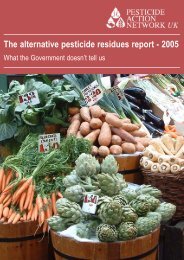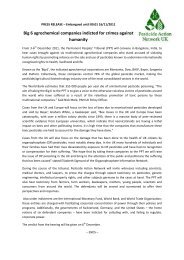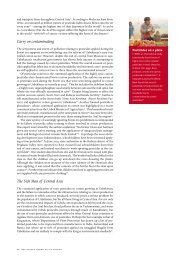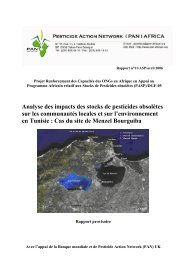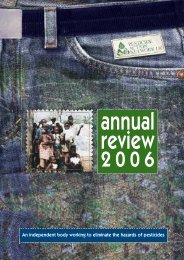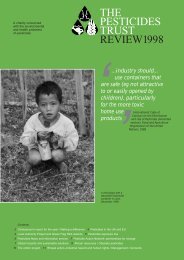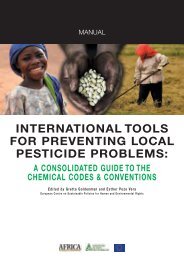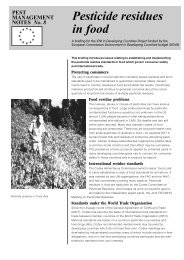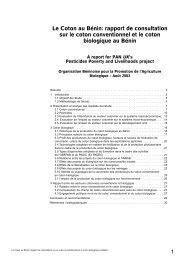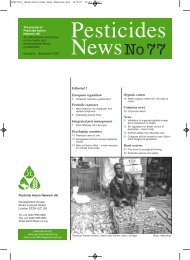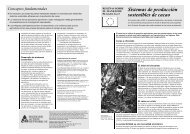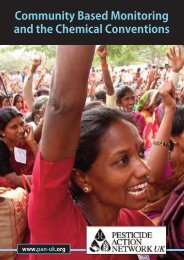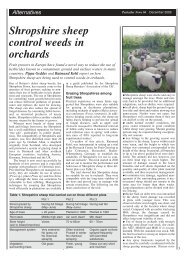Tanzania Multi Stakeholder Map - WebNG
Tanzania Multi Stakeholder Map - WebNG
Tanzania Multi Stakeholder Map - WebNG
Create successful ePaper yourself
Turn your PDF publications into a flip-book with our unique Google optimized e-Paper software.
Mr. Akhabuhaya – Registrar of Pesticides, Tropical Pesticides Research<br />
Institute<br />
The presentation gave a brief history of the International Code of Conduct on the<br />
distribution and use of pesticides.<br />
The objectives of the code are to establish voluntary standards and shared<br />
responsibilities to all stakeholders with respect to the distribution and use of<br />
pesticides (especially where there is inadequate or no legislation) so as to ensure<br />
effective and safe use of pesticides. Major stakeholders are Governments<br />
(importers and exporters), international organization, pesticides industries<br />
including manufacturers, traders, exporters, distributor etc. other stakeholders<br />
are Farmers, Food industry, Consumers, Environmentalists, Crop consultants,<br />
NGOs etc.<br />
The presenter noted the following challenges hampering full implementation of<br />
the Code: Lack of funds, personnel, poor infrastructure etc; poor planning of<br />
activities; and ignorance of roles and activities; Deficient laws and regulations<br />
(PPA and regulations are being reviewed); Uninformed and unwilling<br />
stakeholders and not all stakeholders know their role; and some who know are<br />
reluctant. In order to meet these challenges there is a need to update laws and<br />
regulations (incorporate the Code articles; introduce penalties etc.); create<br />
sustainable capacity building activities; adequate staff and laboratories; have<br />
enough technical training; conduct common workshops and meetings; effective<br />
information exchange mechanism (publications, websites etc); adequate<br />
sensitisation on the CODE to all stakeholders and the general public; pressure<br />
from stakeholders such as NGOs; individuals; and through mass media etc.<br />
The presenter elaborated on how observance of the code would contribute to<br />
poverty alleviation. Minimizing pesticides use (through IPM, minimal imports,<br />
judicious uses etc) will save foreign exchange and minimize health &<br />
environmental risks; minimise obsolete and other unwanted stocks; increase<br />
exports through minimal residues, and high quality products; increase<br />
productivity through use of quality and recommended products use; and save<br />
farmer and country’s money through elimination of “fake pesticides”, elimination<br />
of illegal distributors, importers etc.<br />
After the presentation, participants asked that FAO Code of conduct is a<br />
voluntary mechanism as presented. Being voluntary code without a legal or<br />
enforcing mechanism, how its implementation could be ensured, and the reaction<br />
was that it is really voluntary but also it has been a good source of other chemical<br />
conventions such as PIC (Basel), Rotterdam, etc. Implementation of these<br />
Conventions will indirectly mean complying with the Code of conduct. It was<br />
further commended that FAO code is broad in nature, it is difficulty to make<br />
mandatory due to a lot of activities put in place and there are so many topics to<br />
14




